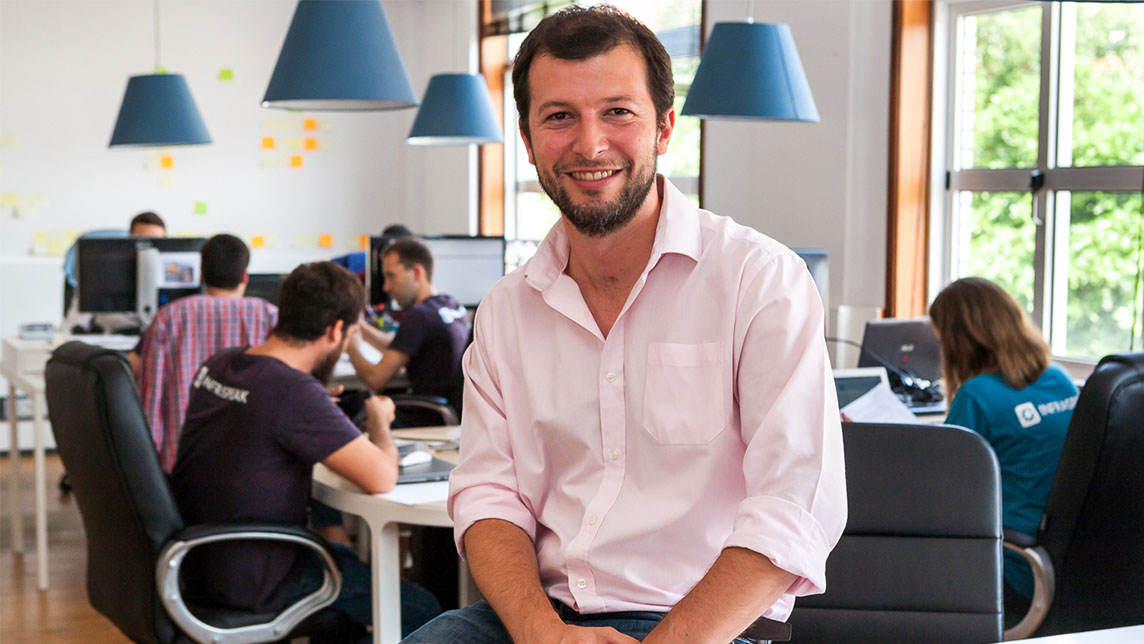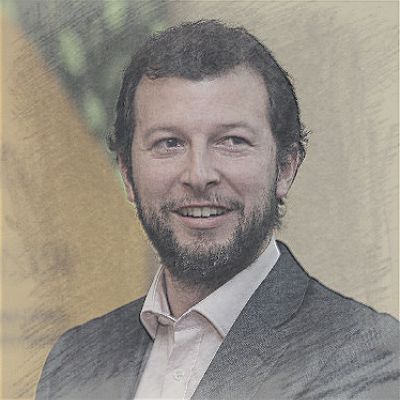From malls to airports, resorts to hospitals, the number of large public facilities is fast rising worldwide. Such infrastructure, with ever more assets to manage and maintain, are becoming more complex for maintenance and facilities managers to oversee. The largest facilities, especially malls and airports, each have hundreds of thousands of pieces of equipment, many of which, if they malfunction, can cause severe disruption to customers.
No surprise then that the global facilities management outsourcing market is forecast to reach nearly $1tn by 2025, compared with $780.04bn in 2016.
Facilities management platform Infraspeak's founders CEO Felipe Ávila da Costa and CTO Luís Martins were well aware of this. Unlike most founders of startups, they did not set up their own company because of having experienced a pain point that they then try to solve, but as a hobby. Since its founding in 2015, Infraspeak has grown exponentially, with 11 clients secured by the end of its first year in operations.
The cloud-based software-as-a-service (SaaS) is now in eight different countries: Brazil, the US, Spain, Portugal, the UK, France, and the African Lusophone nations of Mozambique, Angola and Cape Verde; it is now poised to enter a ninth, Poland.
Early next year, the company is looking to raise €10m to €12m in a Series A funding round to expand to more European markets, including Germany, Italy, Poland and the Scandinavia, CEO Felipe Ávila da Costa told CompassList in an interview at the Lisbon Investment Summit. The startup will also continue to focus on the US, where a large chunk of its target market is.
With high-profile customers like Siemens, luxury hotels chains Intercontinental, Hilton and Sheraton, L’Oréal, McDonald's, Dominos Pizza and Rio de Janeiro's International Airport, the Portuguese startup now runs the facilities management of about 190 companies.
Low digitization
Silicon Valley-based 500 Startups and Caixa Capital, one of Portugal's most prolific venture capital firms, together with four other investors pumped €1.6m into Infraspeak's seed round in late 2018. The startup was incubated at the University of Porto's Science and Technology Park (UPTEC), the starting ground for today's big startups names like Defined Crowd and Veniam.
The idea for Infraspeak came from Martins, a trained civil engineer and a hobbyist programmer since childhood. He combined these two passions for his final project at the University of Porto, designing software to maintain the engineering faculty's 16 buildings. Upon realizing the potential marketability of his project, he joined UPTEC's incubation center where he got to know Ávila da Costa, who was heading the UPTEC tech center and had been mentoring startups for the past five years.
“I am a software engineer by profession but had also started my own companies," Ávila da Costa recalled. “I was feeling the call of becoming an entrepreneur again when Luis appeared and we decided to take the idea of Infraspeak to market.”
He said the business opportunity was considerable as luxury hotels, hospitals, malls have a huge demand for quality and reliability, large and complicated infrastructure with many assets and a low level of digitization. A 2017 McKinsey study found that the travel sector, including hotels, airports and theme parks, had a digitization level of only 44% – behind healthcare, high-tech, retail and media.
Ávila da Costa noted: “In a hotel with 250 rooms, there are 40 technical failures per day on average.” He gave a typical example from the hotel sector that platforms like Infraspeak can assist with: When a minor problem like a spent lightbulb is discovered, the housekeeper who first finds out about it notes the problem on a piece of paper which, hours later after making the rounds, is left at reception. Later still, the maintenance team pick up this piece of paper, along with any other requests, and attends to it.
“It takes so long that sometimes there is another customer in the room already, whereas if they had used our platform, housekeepers can use their phone, take a picture, send it in real time, and the problem may get fixed in 10 minutes,” Ávila da Costa said.
Corrective, predictive
The CEO shared how a customer, a UK-based mall, realized how it would have benefited from a facility management platform after an extraction fan in its food court broke down for seven hours.
“They could not cook or sell any food during this time, causing a significant financial impact. Upon examining the machinery, the technicians found that both temperature and vibrations had been getting higher and higher for five weeks before the breakdown, but they didn't notice because they had no display to warn them.” Now, the mall is an Infraspeak customer.
The platform provides both corrective and preventive maintenance, the former to report and manage problems after they have occurred and the latter to manage scheduled or pending tasks. It was the first maintenance and facility management software to incorporate near-field communication (NFC) technology to access real-time data from the assets under management. NFC technology allows contactless communication between NFC-enabled devices, like smartphones, with devices that contain a NFC tag. Customers also have option of gaining insights by opting to run audits and generate reports , including ones on the performance of equipment under management or energy costs.
In terms of corrective maintenance, any Infraspeak user can report failures in real-time that are then automatically assigned to the right technician for the job. The preventive option describes each intervention required and automatically estimates its duration, allowing real-time tracking of tasks. The platform is very visual with the NFC tags displaying all pending tasks at a touch.
The next step for Infraspeak is to introduce a predictive module, which is currently under development, leveraging artificial intelligence (AI) and including information from sensors.
“We are building predictive models that will allow us to notify a manager saying, for example, that a piece of equipment has an 80% probability of failure in the next two weeks,” said Ávila da Costa. He added that there “is a huge demand” for this in hospitals and airports, where any failure, for example in air conditioning systems, can cause immediate chaos and render facilities temporarily unusable.
How has Infraspeak managed to grow exponentially in a market with 300 competitors? Ávila da Costa puts the company's success down to cost, convenience and ease-of-use, noting, “some competitors, like SAP, are really really expensive and complex to use.”
Infraspeak costs from €24 per user per month, but most customers spend from as little as €150 to as much as €3,000 to €4,000 per month, with the price varying according to the number of overall users, including technicians using the mobile app and managers accessing the web interface.
“Our competitors usually take four months – or even six – to implement a system and for it to become fully operational,” he said. “For hotels, we take just one week and for larger infrastructures, like airports, we take three to four weeks.”
Company-wide customer knowledge
Other competitive advantages include NFC technology thus allowing easy interaction with equipment, a “strong API that allows us to integrate with other software which is way different from others [its competitors] on the market” and the platform's “app store" inside of the product which provides flexibility for the customer. Each user starts with the core modules of inventory – building management and corrective and predictive maintenance – and can choose additional aspects to manage, like energy consumption and stock.
Ávila da Costa said: “Customers who want to keep it really simple can do so and those that want to go the extra mile can select additional functionality from the store.” The platform provides different configurations when accessed by different staff, from housekeepers to operations managers, such that it displays information relevant to each job.
Every new customer is assigned a support manager who guides them personally through a training process with five steps – four of them online and one face-to-face – to ensure that each customer gets the most out of the product.
Ávila da Costa said the benefits of using Infraspeak's technology include technicians receiving fewer phone calls and experiencing increased efficiency while managers get to reduce administrative time by around 40%. Quality managers experience increased customer satisfaction levels while financial controllers experience fewer failures and thus less unpredictable costs. The savings could be substantial in large infrastructures, like a mall.
“Extend the lifetime of equipment in malls, which can total hundreds of thousands assets, by one year or two and they can save millions,” Ávila da Costa said.
The company has a systematic approach for entering each market and gaining traction. Each time, it builds a team of four, consisting of a country manager, customer success manager, marketing head and salesperson. Infraspeak also collaborates with entities selling relevant technology, such as elevators and air conditioning to promote the product amongst their customers. The company also requests referrals from clients via its customer success managers.
Getting to know each customer is not only vitally important in terms of customer satisfaction, but also for building team spirit. Ávila da Costa said: “It's really important to celebrate every minor milestone. For every customer we close, we toast in honor of that customer with the entire team, so that staff who are not customer-facing can get to know the customer and share in the success.”













